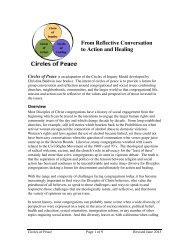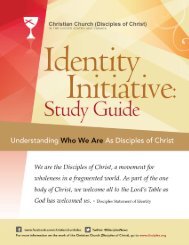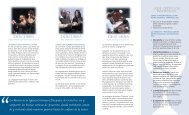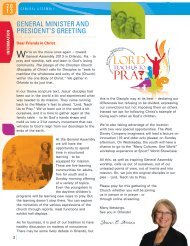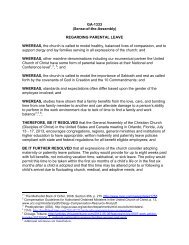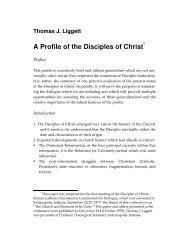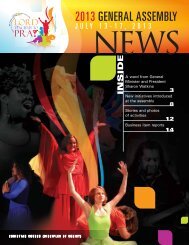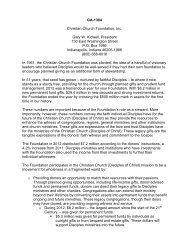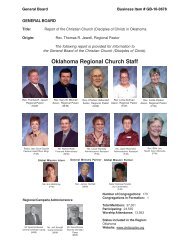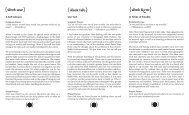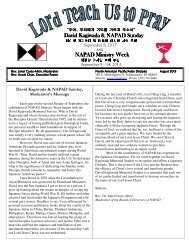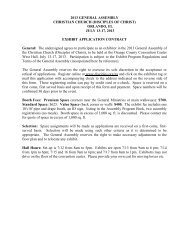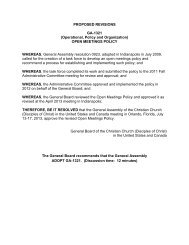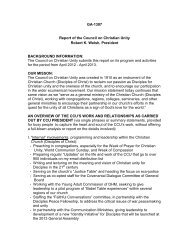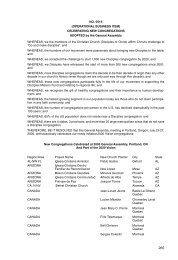RESOURCING THE CHURCH FOR ECUMENICAL MINISTRy A ...
RESOURCING THE CHURCH FOR ECUMENICAL MINISTRy A ...
RESOURCING THE CHURCH FOR ECUMENICAL MINISTRy A ...
Create successful ePaper yourself
Turn your PDF publications into a flip-book with our unique Google optimized e-Paper software.
himself, excluding and excommunicating a part of<br />
himself.” 3<br />
We take this seriously. When Disciples attend a<br />
church service in which there is no observance of the<br />
Supper, or in which participation in the Supper is<br />
limited to a select few, we can often hear the<br />
comment made: “I don’t even feel like I’ve been to<br />
church.” Quite frankly, still in the feeling mode,<br />
when we are denied access to the Table, we begin<br />
touching deep-seated notes of anger.<br />
And that reality might help us to understand how we<br />
began two hundred years ago. So let us remember<br />
that Barton Stone found himself in difficulty with<br />
his Presbyterian denominational power structure<br />
because of his radical freedom of thought, and his<br />
practice of an “open” Table. Thomas Campbell was<br />
called to task in part because he committed the sin<br />
of offering the Lord’s Supper to people who were a<br />
part of the main body of Presbyterians, not just his<br />
Seceder Presbyterians. Alexander Campbell found<br />
himself compelled to walk out of a communion<br />
service in his (and his father’s) denomination, the<br />
Anti-Burger, Seceder, Old Light Presbyterians<br />
because of the barriers put up between the people<br />
and the Table.<br />
The birth of the Disciples thus began around<br />
issues of the Table, particularly the belief that the<br />
Table belonged to the Christ, and to all who<br />
followed him.<br />
That’s where we came from. And now, two centuries<br />
later, and two hundred years down the road of the<br />
ecumenical movement, we still find the Christian<br />
community divided most obviously and painfully<br />
when we come to the Table. For theological and<br />
historical reasons, we are not permitted to share at<br />
the Table with many of our sisters and brothers in<br />
the faith. This break in fellowship can never be<br />
acceptable, and must be seen for what it is: sin<br />
against the very heart of the church.<br />
And now, two centuries later, and two<br />
hundred years down the road of the<br />
ecumenical movement, we still find the<br />
Christian community divided most obviously<br />
and painfully when we come to the Table.<br />
In the years to come, the Disciples are in a position<br />
to be advocates for the unity of the faith particularly<br />
as we accept the invitation to come to the Table. And<br />
13<br />
we can never be satisfied with the “way things are”<br />
when worship services include Holy Communion<br />
for some, but not all. Or worse, worship services<br />
which omit the Supper because of its “difficulties.”<br />
And if we come to the Table of our Lord together,<br />
then By God we had best treat other Christians,<br />
other human beings with love and concern, as<br />
family. If we truly are called by our Lord to the Holy<br />
Table, then we must also work to make sure that no<br />
barriers keep us apart. The barriers of nationalism,<br />
race, economic status, gender, sexual orientation,<br />
even creed, none of these can be allowed to stand<br />
between us and the Eucharistic feast.<br />
The ecumenical movement has a future only if we<br />
accept God’s gift of unity, and work to manifest that<br />
unity amongst all the peoples. As Thomas Campbell<br />
proclaimed in his magisterial Declaration and<br />
Address, God speaking through Jesus said that<br />
wholeness, unity among the followers of Christ is<br />
God’s express will that “they may all be one. As you<br />
God, are in me and I am in you, may they also be in<br />
us, so that the world may believe that you have sent<br />
me.” (John 17:20-21, NRSV) To accede to a divided<br />
church, a divided Table, is sin, sin that separates us<br />
not only from one another but also from the Christ<br />
himself.<br />
Within the community of faith it is not only<br />
possible, it is likely that there will be differences of<br />
opinion on matters of ethics, and theology, even<br />
over the Supper itself. However, when we permit the<br />
gentle nudging of the Spirit to operate among us,<br />
we will find ourselves led to places of power and<br />
reconciliation.<br />
If we are to be a part of God’s united church, we<br />
must allow the Spirit’s power of forgiveness and<br />
tolerance to live with us, within us, rushing over us<br />
so that no opinion can overcome the unity with<br />
which we have been blessed, unity that brings us<br />
together at the Table of reconciliation and peace.<br />
This will require humility of the first order. And we<br />
will be called upon to live a tenderness and<br />
generosity of affection for and with each other, even<br />
as we experience such tenderness and affection with<br />
those beside us and across from us at the sacred<br />
Table.<br />
There are many points of division within the church<br />
today, and if we are seriously engaged in seeking to<br />
live the unity of the church which God lays before<br />
us, we will have some profoundly difficult moments.<br />
If we think that we have the ability to overcome the<br />
Harrison • The Lord’s Supper and Our Vision of Christian Unity Today



